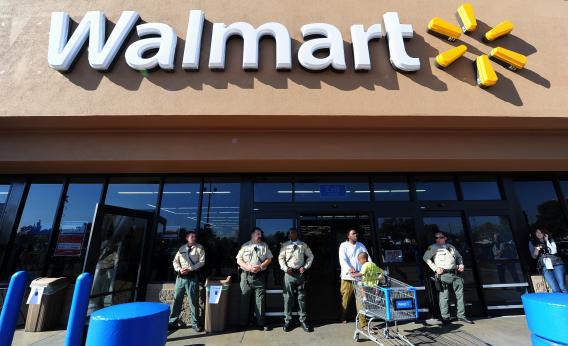Erik Loomis desperately wants anti-Wal-Mart labor actions to succeed, but is a bit pessimistic:
While the United Food and Commercial Workers was heavily involved in the Black Friday actions, it wasn’t a true organizing campaign in the sense of creating a union or even reaching that many workers. Rather, it was about getting word out, convincing people to come out to their local Wal-Mart to protest, and trying to get workers to walk out. Wal-Mart claims 50 workers went out, the organizers say it was closer to 500. Probably the latter is more correct given that there’s no good reason to believe anything Wal-Mart has to say about labor matters. Wal-Mart also claims that it had its biggest Black Friday ever. Could be, but that’s meaningless here since the goal wasn’t really to get people to stop shopping at Wal-Mart. This was about educating the public and worker empowerment. The question now is where this goes. Wal-Mart would close stores rather than see them unionize so it’s tough sell, even at the low wages and terrible benefits. Workers who labor 40 hours a week and still qualify for food stamps don’t have much, but they do have that. If all of this convinces Wal-Mart to raise wages in order to buy workers off from unionizing, then it’s totally worth it. That’s only going to happen if the pressure continues and more workers decide that it’s worth the risk to stand up for a better life.
I think this actually misses the more realistic goal of UFCW action. Obviously, the union wouldn’t mind magically picking up a million new members via mass organizing of Wal-Mart. But that would be, to put it mildly, hard to pull off. What’s more, the union’s first obligation is to its members not to the nonmembers who work at Wal-Mart.
And the issue here, I think, is Wal-Mart’s growing push into urban areas. On my block, for example, there’s a Safeway where I shop all the time and where the workers are represented by UFCW. A few blocks away on New Jersey Avenue, a Wal-Mart is under construction. It’s overwhelmingly likely that I’ll keep shopping at Safeway no matter what happens, but the new Wal-Mart will dountless cost the Safeway some customers and thus potentially cost UFCW jobs and/or impair the union’s ability to secure higher wages for its members. One important goal of anti-Wal-Mart actions is to try to make sure this scenario doesn’t play out in more cities across America. There are lots of regulatory tools that can be brought to bear against new entrants in the supermarket industry if public opinion in left-wing areas is sufficiently mobilized against Wal-Mart. And by shielding unionized supermarkets from competition, the jobs of the existing union members are made more secure. What happens to the people who do work at Wal-Mart is more of a secondary concern.
